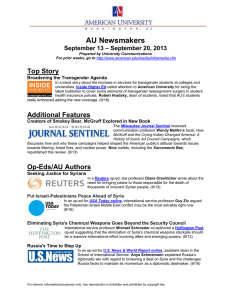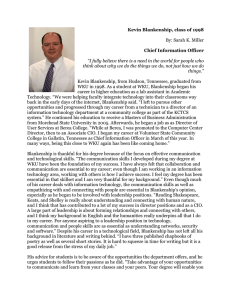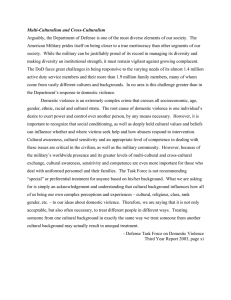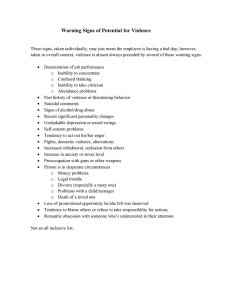AU Newsmakers Top Story – February 17, 2012 February 10
advertisement
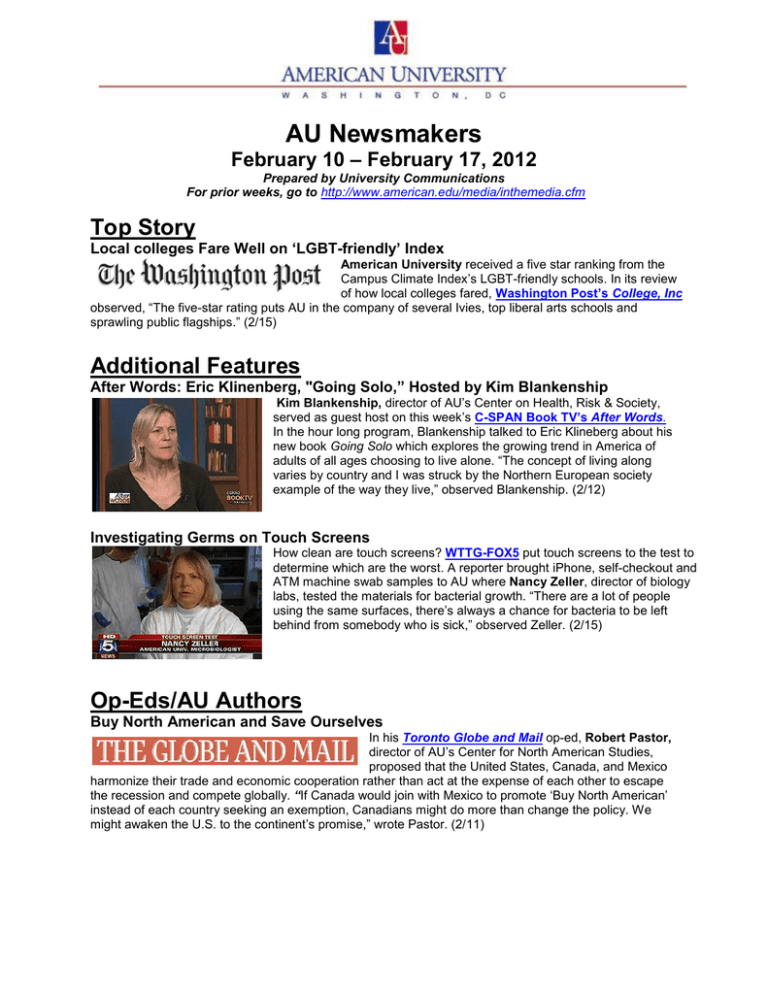
AU Newsmakers February 10 – February 17, 2012 Prepared by University Communications For prior weeks, go to http://www.american.edu/media/inthemedia.cfm Top Story Local colleges Fare Well on ‘LGBT-friendly’ Index American University received a five star ranking from the Campus Climate Index‟s LGBT-friendly schools. In its review of how local colleges fared, Washington Post’s College, Inc observed, “The five-star rating puts AU in the company of several Ivies, top liberal arts schools and sprawling public flagships.” (2/15) Additional Features After Words: Eric Klinenberg, "Going Solo,” Hosted by Kim Blankenship Kim Blankenship, director of AU‟s Center on Health, Risk & Society, served as guest host on this week‟s C-SPAN Book TV’s After Words. In the hour long program, Blankenship talked to Eric Klineberg about his new book Going Solo which explores the growing trend in America of adults of all ages choosing to live alone. “The concept of living along varies by country and I was struck by the Northern European society example of the way they live,” observed Blankenship. (2/12) Investigating Germs on Touch Screens How clean are touch screens? WTTG-FOX5 put touch screens to the test to determine which are the worst. A reporter brought iPhone, self-checkout and ATM machine swab samples to AU where Nancy Zeller, director of biology labs, tested the materials for bacterial growth. “There are a lot of people using the same surfaces, there‟s always a chance for bacteria to be left behind from somebody who is sick,” observed Zeller. (2/15) Op-Eds/AU Authors Buy North American and Save Ourselves In his Toronto Globe and Mail op-ed, Robert Pastor, director of AU‟s Center for North American Studies, proposed that the United States, Canada, and Mexico harmonize their trade and economic cooperation rather than act at the expense of each other to escape the recession and compete globally. “If Canada would join with Mexico to promote „Buy North American‟ instead of each country seeking an exemption, Canadians might do more than change the policy. We might awaken the U.S. to the continent‟s promise,” wrote Pastor. (2/11) Bahrain’s Unfinished Revolution Holds Lessons for the West In her op-ed for the Financial Times, Kristin Diwan, assistant professor of comparative and regional studies, analyzed the continuing strife in Bahrain between the Sunnis and Shias on the anniversary of protests in Pearl roundabout. “The Saudi and Bahraini leadership have unleashed an onslaught of sectarianism, dividing Gulf publics along Sunni and Shia lines, when unity is needed to correct the real problem: a lack of representation,” wrote Diwan. (2/13, subscription required) Expertise Redistricting by Citizens' Panel Sparks Competitive California Congressional Races To the San Jose Mercury News James Thurber, director of the Center for Congressional and Presidential Studies, explained California‟s congressional redistricting impact on the 2012 elections after citizen panels rather than the partisan state legislature redrew districts. “This year's action in California once again shows what can happen when the members don't draw the lines themselves," said Thurber. (2/12) Government hopes to help create new solutions through data release “The government‟s decision to release data for anyone to use and to promote crowdsourcing is good news and a good trend, said Scott Talan, associate professor of communication, to Scripps Howard Foundation Wire about federal agencies promoting data use and data understanding to spur innovation. (2/10) Objections to Reauthorizing the Violence Against Women Act Amy Myers, director of the domestic violence clinic at the Washington College of Law, spoke to WAMU 88.5’s The Diane Rehm Show about the Violence Against Women Act (VAWA) and the threat to its reauthorization. “We've seen reporting of domestic violence go up during the time that VAWA has been in place, and I think that might not reflect an increase in domestic violence, but an increase in women and men survivors seeking services,” said Myers. (2/13) Dos and don'ts of online communications For Federal Computer Week online Naomi Baron, executive director at the Center for Teaching Research and Learning, provided several tips for better online communication. “It‟s important to remember that your audience may be far larger than you have anticipated,” Baron cautioned. (2/10) United Nations’ General Assembly Non-Binding Syria Resolution David Bosco, assistant professor of international politics, appeared on BBC World News to discuss the United Nations General Assembly‟s overwhelming non-binding condemnation of Syria‟s Bashar al-Assad‟s brutal crackdown on protestors in contrast to action taken by the UN Security Council‟s action against Libya earlier this year. “I don‟t‟ think the West has any appetite for intervention here [Syria]. Russia and China by blocking things is giving the West a pass,” said Bosco. (2/16) Putin’s Views for a Better Russia Anton Fedyashin, associate director of AU‟s Initiative for Russian Culture, spoke to Voice of Russia about Prime Minister Vladimir Putin‟s recent op-ed outlining his views for a better Russia through various reforms. “Putin seems to recognize that it‟s time for the government to begin to respond to a new, powerful, and increasingly vocal middle class that is beginning to demand its rights from the government,” said Fedyashin. (2/13)

